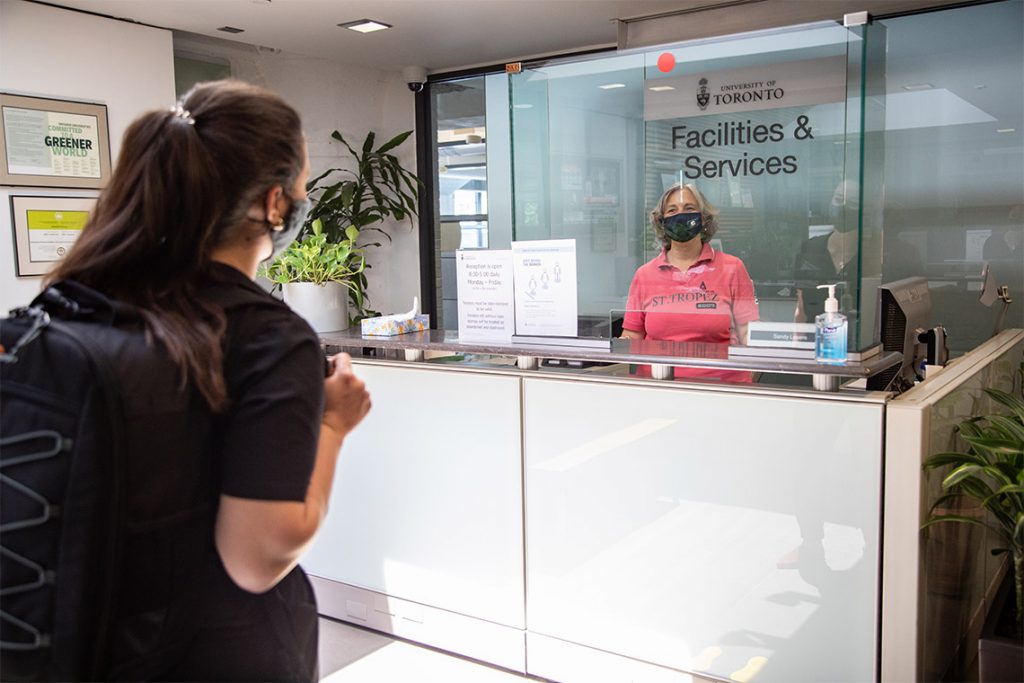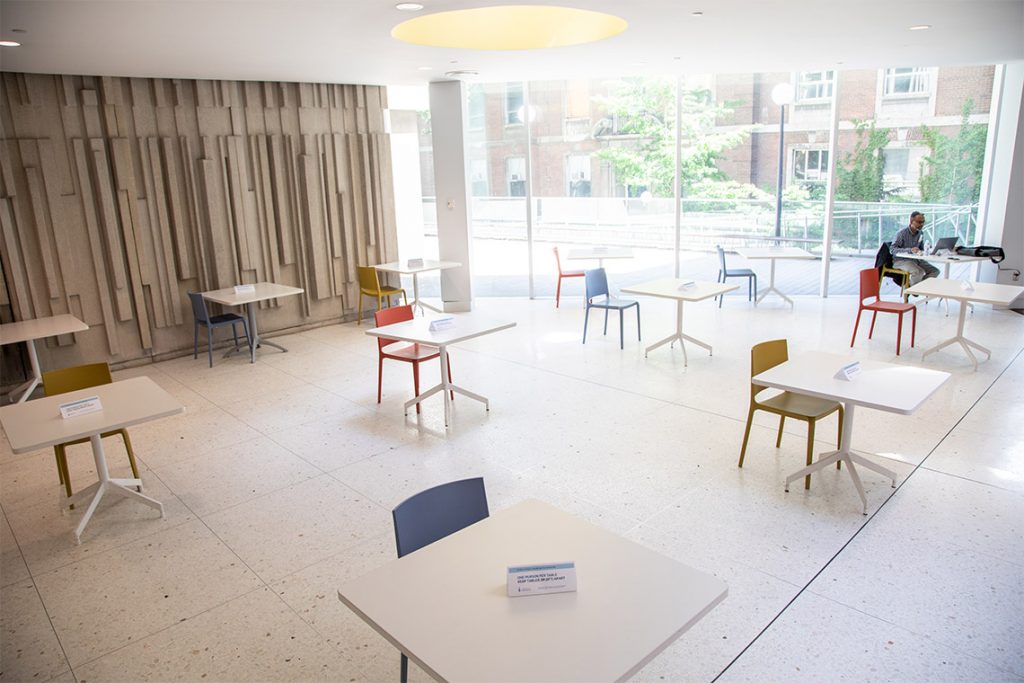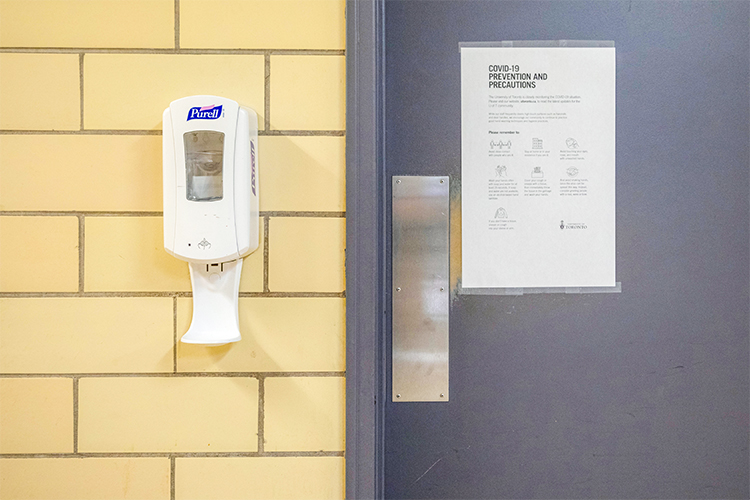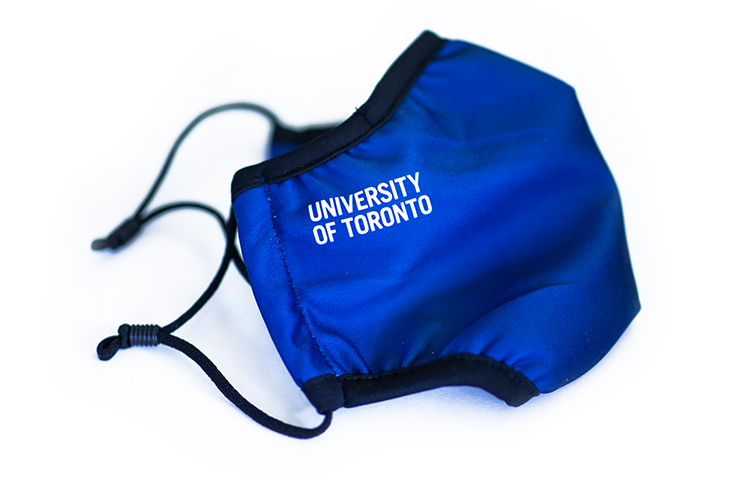
The University of Toronto is implementing a number of changes on campus to ensure the U of T’s community’s safety in advance of the fall semester.
As the world continues to grapple with COVID-19, new and returning students will see signs promoting good hand hygiene and other safe practices across U of T’s three campuses, as well as new sanitizer dispensers. To encourage physical distancing, students, faculty, librarians and staff will also encounter re-arranged classrooms, shared offices, libraries, teaching labs and other spaces.
Behind the scenes, meanwhile, U of T will be taking additional steps to clean and disinfect public areas.
“We are working tirelessly to provide a safe environment for everyone who uses our campuses, so that they feel comfortable returning to learn, teach and work,” says Ron Saporta, U of T’s chief operating officer, property services and sustainability.
The health and safety measures are just one component of the university’s extensive planning for the fall semester, which is focused on three broad themes: promoting health and safety, advancing academic excellence and meeting the needs of the university community.
As it goes about preparing the campuses, Saporta says U of T is adhering to evidence-based guidelines released by the province of Ontario and the federal government. “As always, we will be keeping a close eye on public health guidelines to ensure our policies and practices are up-to-date,” he says.
Here are six ways U of T plans to keep the university community safe and healthy this fall:
Physical distancing

Signage

Starting this fall, be on the lookout for signage across campus that encourages and instructs everyone to practise physical distancing and proper hand hygiene.
There will also be signs indicating maximum occupancy in meeting rooms and elevators, and signs that direct the flow of foot traffic – not unlike those used by retailers.
More frequent cleaning and disinfecting
Libraries and classrooms will be cleaned five times per week, while surfaces that people often come into contact with, including elevator buttons and doorknobs, will be disinfected twice a day in keeping with Public Health Ontario guidelines.
Caretaking staff are using a new, chlorine-based solution approved for use against SARS-CoV-2, the virus that causes COVID-19.
Sanitizing stations

The university plans to install thousands of hand sanitizer and sanitizing wipe dispensers across the three campuses so that people can easily disinfect their hands and also high-touch surfaces. Each dispenser will be touchless and installed at an accessible height in visible locations.
“We’re trying to empower and enable users of spaces to be able to disinfect shared surfaces and spaces that they use, whether it’s a desk or door handle or armrest,” says Anna Kulikov, U of T’s senior manager, business improvement and strategic initiatives, facilities and services.
Protective measures
Environmental Health & Safety (EHS) is conducting assessments across U of T’s three campuses to ensure that adequate physical distancing measures are in place.
In busy areas where maintaining a two-metre distance from others isn’t possible, or is challenging, the university will assess and install where appropriate protective measures such as Plexiglass barriers and sneeze guards. Gina Trubiani, U of T’s director of occupational health and safety-EHS, says the measures may be set up in high-traffic areas such as campus clinic settings, the TCard office and other places where many people could come into close contact.
Masks

In addition to hand hygiene and physical distancing, experts at the World Health Organization, Health Canada and Public Health Ontario agree that non-medical face masks can help reduce the risk of spreading the virus to others. Masks are especially recommended in busy areas where it’s tricky to consistently keep a safe distance from others.
Starting this summer, U of T will provide about 250,000 non-medical, fabric face masks to students, staff, faculty and librarians (two per person). Individuals who are not required to wear a mask for work purposes may choose to use a non-medical mask as an elective measure while on campus. Wearing a non-medical mask is recommended when physical distancing is not possible. The purpose of this recommendation is to reduce the risk of transmission from asymptomatic individuals.
The university will also determine whether community members should be provided with the appropriate medical masks (N95 masks, surgical masks etc.) when working in specific environments like research labs or health-care settings. Employees conducting assigned work where an EHS assessment determines that personal protective equipment is required will be provided with the appropriate masks based on an assessment of risk.